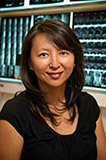CV: Dr. Diane Nam
Bio basics: Associate scientist in molecular and cellular biology and the Holland musculoskeletal research program; orthopaedic surgeon at Sunnybrook since January 2009. Completed clinical fellowship in orthopaedic upper extremity and trauma at Sunnybrook, and a research fellowship in the immune modulation of fracture healing at SickKids. Master of science in pharmacology and bachelor of music in performance (violin), both at the University of Toronto. Two children, aged two and six years.
What is your main research interest?
The molecular and cellular aspects of fracture healing with respect to the immune system. Not all fractures heal properly; I'm interested in finding out why, and what we can do to modify that process.
What are some typical reasons that fractures don't heal well?
There could be many factors, some of which are related to the patient and others that are related to the nature of the injury or fracture pattern itself. For instance, patients with compromised immune systems have a decreased ability to heal. Smoking and infection also have adverse effects on bone healing. However, high-energy injuries and complex fractures are also at higher risk for impaired healing. Other times, we just don't have a clear reason.
What's the goal of your research?
Five per cent to 10% of patients with fractures don't heal properly. If we can understand why, at the molecular level, we may be able to improve outcomes for patients by modulating key pathways involving the immune system, potentially through diet, molecular activators or other pharmaceuticals. This could result in speeding up the healing time or even allow the healing of all fractures. The mechanism between the immune system and bone biology has been an emerging field in the last five years, and with SRI's immunology expertise and Sunnybrook's volume of trauma, the interaction here between clinicians and researchers makes it an ideal place to do this research.






